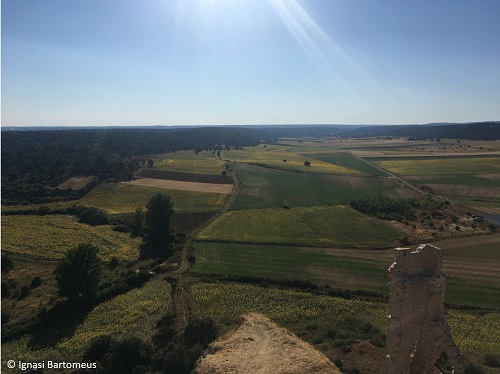Biodiversity on farmland is steeply declining throughout Europe and society at large is increasingly concerned about the loss of public goods, such as iconic local fauna and cultural landscapes. In this context, the SHOWCASE project was launched to create synergies and bridges of knowledge incentives between agricultural producers and biodiversity management practices with the aim of facilitating the agricultural sector's transition towards more sustainable farming.
"With this project we want to support farmers who are willing to take care of their land and create biodiverse and profitable areas. We want to give voice to a sustainable way of farming that allows nature to be conserved in productive landscapes", says Ignasi Bartomeus, project coordinator at the Doñana Biological Station (EBD-CSIC).
The SHOWCASE project is an international project funded by the EU-H2020 program in which 21 public and private institutions throughout Europe take part. The Doñana Biological Station will be the coordinator of the Work Package about the communication of the benefits of agrobiodiversity through multi-stakeholder knowledge exchange.
In short, the aim is to involve the agriculture, research, conservation and management sectors in a collaborative process to find win-win solutions. This means to create communities where everyone can collaborate to design, implement and evaluate measures that improve nature conservation while maintaining the productivity and sustainability of the fields.
What does the project consist in?
"From the SHOWCASE project, a common-sense farming will be supported, agriculture that thinks long-term and is committed to the environment. There is no single recipe for this. Success lies in co-designing measures adapted to the economic, social and ecological reality of each place and evaluating this process rigorously", explains the researcher.
In Spain, the team is starting to build this community in the Guadalquivir valley (North of Seville) around fruit crops, but not necessarily restricted to them. The actions carrying out can vary from the development of simple tools to measure the pollinator potential of the farms, to the optimization of the use of water. Everything will depend on the needs and possible solutions that can be found along the way.
Any agent involved with sustainable agriculture or biodiversity can participate in the project in different ways: from sharing experiences through workshops, interviews or questionnaires to implementing co-designed measures based on biodiversity in the field. "The only objective is to make the project useful for all, an opportunity to benefit from resources and shared experience," says Bartomeus.
Later on, documentation and resources will be generated to help other regions to get organized with the support of the SHOWCASE team. They will offer knowledge and information to design and, above all, to rigorously evaluate the result of the different innovations. In addition, the power of an international project with a voice in Europe can help the voice of the people who work in the sector to reach those who design the future European agricultural policy.
More information: https://www.beeproject.science/eba.html
Project website: https://showcase-project.eu/
https://showcase-project.eu/








 ¡Abierta convocatoria para proyectos de investigación en la ICTS- Doñana!
¡Abierta convocatoria para proyectos de investigación en la ICTS- Doñana!


